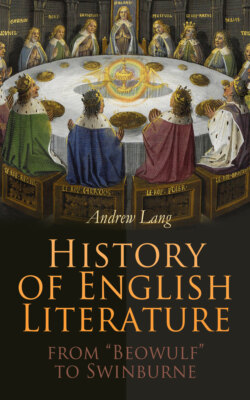Читать книгу History of English Literature from "Beowulf" to Swinburne - Andrew Lang, Robert Kirk - Страница 53
На сайте Литреса книга снята с продажи.
The Story of Troy from Homer to Shakespeare.
ОглавлениеThe history of the development of the "Tale of Troy," as Chaucer and even as Shakespeare knew it, is very curious. Homer himself, perhaps living about 1100-1000 b.c., tells, in the Iliad and Odyssey, parts of the "Tale" as it was known to his own people, the conquering Achæans, who were to the older dwellers in Greece what the Normans were to the English. They finally melted into the older population, who, about 800-700 b.c., wrote poems of their own about the "Tale of Troy," altered the facts, and blackened the characters of Homer's greatest heroes. Later, again, the great Athenian tragedians, of the fifth century b.c., wrote dramas more on the lines of the conquered population of Greece than on those of Homer, and they still more deeply degraded some of the heroes of Homer. The Romans, looking on themselves as descended from the Trojans, persevered in the same course, and a Greek, after the Christian era, wrote a prose version of the "Tale of Troy," pretending that it was a manuscript by Dictys of Crete, who was a spectator of the Trojan war. A similar prose book was attributed—to another spectator, Dares of Phrygia. These books tell the story of Troilus and Cressida, of Palamedes, and many other tales unknown to Homer. But, in Western Europe, Homer was unread, and unknown in England till Chapman translated him: and all the romancers about Troy—Lydgate, Chaucer, Caxton, and the rest, down to Shakespeare,—depend on the false tales whose growth we have described.
Probably the first romancer who expanded the bald prose narratives of Dares and Dictys, was Benoît de Sainte-Maure (1160) in a long French rhyming poem. He unites the fates of Briseida (Briseis, daughter of Calchas, the Greek priest who is made a Trojan), and Troilus, son of King Priam. Briseida, through a confusion with Homer's "Chryseis," daughter of Chryses, the Phrygian priest of Apollo, later becomes the "Cressid" of Chaucer and Shakespeare. Meanwhile "Gydo" or Guido de Colonna, did the French of Benoît into Latin prose (1287) and Guido is the source of the English authors of the alliterative and the rhyming romances of Troy. The pedigree of the story is
Pseudo-Dares—Pseudo-Dictys
|
Benoît de Sainte-Maure
|
Guido de Colonna
|
The English Romances.
Through Caxton's printed "Book of Troy," the story continued popular, a cheap edition appeared in the eighteenth century.
Each of Homer's poems, the Iliad and the Odyssey, deals but with the adventures of a fortnight, or six weeks, but the mediaeval readers wanted, and from the romancers received, the whole history of the ten years' siege, and more, with Christian legends thrown in, with minute descriptions of all the characters—Cassandra "gleyit a little," had a slight cast of the eye like Mary Stuart. The heroes fight as mounted knights, not in chariots; they use cross-bows as well as long-bows; and Hector kills men by the thousand, with more than Irish exaggeration. As Hector must be killed, Achilles suddenly charges him in front, while his shield is slung behind. Had a Trojan poet left an epic on the war he would not have told the story otherwise. The poet of the Laud "Troy Book" bids God curse Æneas as a traitor, forgetting, apparently, that the British are descendants of Æneas.
